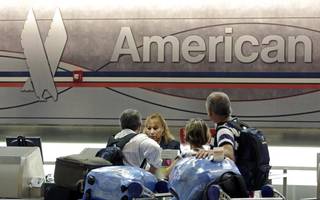Airlines are following precautions and trying to ease fears of travelers and employees since it’s now known that the first person in the United States diagnosed with Ebola flew on a U.S. airline.
Despite repeated statements by public health officials that there was “zero risk of transmission” of Ebola during the patient’s flights, concerns about spread of the disease and air travel are growing.
“For most people, it’s a scary, scary thing,” said travel expert Tom Parsons.
Certainly, travel to Africa will be affected but also travel to others parts of the world might suffer, said Parsons, who is chief executive of BestFares.com. He pointed to two similar health threats that hurt air traffic — swine flu, which “just killed” travel to Mexico in 2009, and an outbreak of severe acute respiratory syndrome (SARS), which hurt air travel to Asia in 2003.
For the time being, an industry trade group and some airlines, including Dallas-based Southwest Airlines, said they have not received concerned calls from travelers or industry workers. That could change.
Karen Franquiz of Allen, who was at Dallas Love Field Thursday to pick up her father from Georgia, said she’s thinking a little differently.
“When someone just came off the escalator and sneezed, I thought, ‘They didn’t cover their mouth,’” she said. “It’s a concern because I have school-age children.”
The Dallas Ebola patient, Thomas Eric Duncan, began traveling from Liberia and landed in Dallas on Sept. 20. Liberia is one of a few West African countries with unprecedented outbreaks of Ebola.
Details of his travel route emerged Wednesday. Duncan flew on three flights and traveled through four airports on three continents. He left Monrovia, the capital of Liberia, on Sept. 19 and flew to Brussels, Belgium, on Brussels Airlines. After a layover of nearly seven hours, he boarded United Airlines Flight 951 to Dulles International Airport near Washington, D.C., and nearly three hours later he flew on United Flight 822 to Dallas/Fort Worth International Airport.
Duncan developed symptoms on Sept. 25 and was admitted to Texas Health Presbyterian of Dallas on Sept. 28.
Public health officials have said passengers and crew on Duncan’s flights were not at risk because he did not have symptoms and therefore was not contagious. Ebola is spread through direct contact with infected blood or other body fluids.
“We’re not hearing a great amount of panic from our flight attendants,” said Corey Caldwell, a spokeswoman for the Association of Flight Attendants, the union representing flight attendants at United and American. “They’re first responders who are in this work environment that often puts them in contact with the ill.”
United is contacting employees and customers.
Airlines have procedures in place to monitor and respond to potential health threats, including guidelines to help identify and treat ill travelers and to clean planes.
The U.S. Department of Transportation lets airlines deny boarding to passengers with contagious diseases that could spread during a flight. The pilot of a U.S.-bound international flight is required by law to report ill travelers with certain symptoms, or deaths on board, to the Centers for Disease Control and Prevention before arrival.
If a traveler is diagnosed with Ebola on a flight, the CDC would assess the risk and inform passengers and crew of possible exposure.
“The CDC has made it clear that this is not an airborne disease and the risk to anyone traveling anywhere is minimal to bordering on nonexistent,” said Jean Medina, a spokeswoman for the trade group Airlines for America. “The CDC has very clear guidelines for airlines and travelers for any communicable disease and those are always followed.”
Carriers, including United, Southwest and Fort Worth-based American Airlines, said they’re following such protocols.
United cleaned the two aircraft after the two flights on Sept. 20, United spokeswoman Christen David said. The two planes “remained overnight for a thorough cleaning, including lavatories and galleys, with heavy-duty all-purpose cleaners” and tray tables and armrests were wiped with disinfectant, she said.
Following CDC guidelines, Southwest has advised employees to treat any bodily fluid as though it is infectious. It also has told them to avoid touching their mouth, eyes and nose, and that hand washing is the most important infection control measure.
Southwest also advises passengers to “practice common sense and good hygiene while traveling, such as washing hands frequently and deferring travel in the event of illness,” said spokeswoman Brandy King said. “The safety of our customers and employees is our number one priority and we will continue to closely monitor the situation.”
The Associated Press and Bloomberg News contributed to this article.
Follow Sheryl Jean on Twitter at @SJeanDallas.















